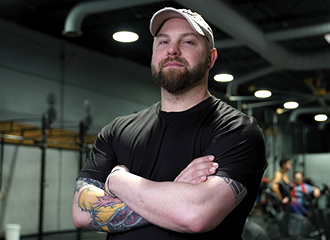Army Veteran Describes How He Learned To Love Himself Again
4-minute read
Army Veteran Describes How He Learned To Love Himself Again
4-minute read
Amid severe issues with anger, survivor guilt, and the injury that prematurely ended his Army career, Zack was presented with a challenge during a nighttime conversation with a friend he had moved in with.
“I truly believe that, if you look at it, you probably don’t even love yourself anymore,” his friend, a Navy Veteran, told him. Then his friend challenged him to walk upstairs, look at himself in the mirror, and tell himself he loved himself.
“Too easy,” Zack thought. He stomped upstairs, looked in the mirror, and began to try to say the words.
“I lo—” was as far as he could get before collapsing and experiencing a panic attack.

Guilt to Gratitude: Army Veteran Shares How Treatment Changed His Life
“Leader’s guilt”
How did Zack reach this point? It might have started on his deployment as an infantry officer for a mission he helped plan. Six weeks into the mission, Zack was watching live drone footage when 6 Soldiers were killed in an ambush.
“Instead of the survivor’s guilt a lot of my guys were having trouble with, I also had another piece of, like, leader’s guilt,” Zack says. “For a long time, I blamed myself for getting the guys killed, for actually killing my guys, and that was a big piece that I struggled with, especially once we got back in the States. One of the guys, Joey, was 24 years old, 3 months from getting out, left a wife and three kids, and losing him was a really big hit for a lot of us.”
Zack also was injured during his deployment, with ulnar nerve damage that wasn’t discovered until 18 months later, when it started to cause atrophy in his entire left arm. His surgery did not go well, and he had to leave the service with a medical discharge.
“Mad at the world”
Zack left military service in a bad mental state.
“I was angry at everybody—angry at God, angry at family, angry at friends, very mad at the world,” he says. The loss of his Soldiers also continued to haunt him, especially the death of Joey.
“Every time I go to see family, it immediately goes back to Joey, who isn’t there anymore,” he says. “His kids don’t have a father, his wife doesn’t have him, the parents don’t have him as a son.”
In his feelings of despair, Zack contemplated suicide. He even sent a final text message to his ex-wife, assuring her that she and Zack’s goddaughter would be taken care of. She responded by telling him she was sending police to his home to stop him.
“Let me fix it”
Eventually, Zack moved in with his Navy Veteran friend, and the night of his panic attack in front of the mirror proved to be a turning point.
“It was the point that I realized that something was broken,” Zack explains. “That’s an empowering thought to me, ’cause I grew up fixing things. Something’s broken, let me fix it. And that first step was seeking therapy.”
Zack says his weekly sessions with a therapist have been a big help because his therapist understood his needs. “He did a great job of making me feel comfortable enough to do the thing all men hate and share feelings,” Zack says. He recalls the therapist’s words of encouragement: “Don’t run from the feelings. Sit in whatever you’re feeling, so that way you can actually start working through and analyzing what those feelings are coming from, and how to handle those.”
Motivated by his therapist, Zack tried different self-help techniques and found that keeping a journal, meditating, and reading more books helped him. He also began exercising early each day.
“Working out really sets a tone for my day with my mental health,” he says. “I can start with some endorphins, get a good endorphin release in the morning, and it keeps me on a high, essentially, throughout the day.”
“You can fix it”
Zack credits therapy with putting his life back on track.
“I’m in a good relationship now with my significant other,” he says. “That would’ve never happened, man. Having a partner at home, a battle buddy in a relationship, has been awesome.”
“Family’s back on the table again,” he continues. “I think one of the biggest shifts is really recognizing, like, I actually do deserve that, and not blame myself for all the families that don’t have that because of what we went through.”
Zack wants other Veterans to know they can find a new way forward, too. “If you can recognize that broken link, you can fix it,” he encourages them. “Just don’t avoid looking for that piece, no matter how uncomfortable it may be.”
